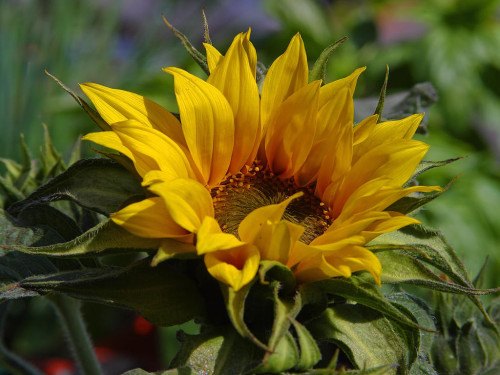TWH – For many people around the world, this week marks the celebration of the summer solstice, also known as midsummer or Litha. It is at this time that the Northern Hemisphere is tilted closest to the sun. The astrological date for this year’s solstice is June 21 at 04:24 UTC (or 12:24 a.m. EDT).
In honor of the abundance of daylight and sunshine, communities have long used bonfires, music, dancing, and outdoor festivals as traditional features of both religious rituals and secular celebrations. In some modern Pagan practices, it is believed that this holiday represents the highest ascendancy of masculine divinity.

[Public domain].
There are several international secular holidays that correspond to the midsummer holiday. In 1982, Make Music Day, held annually June 21, was established in France and has since spread to become a global solstice celebration of sound. On that same day, others will be honoring the United Nations’ official International Yoga Day, while still others will be taking to the warm summer mountain trails to celebrate Naked Hiking Day.
June also marks gay pride month — officially proclaimed this year as Lesbian, Gay, Bisexual, and Transgender Pride Month — which has grown in popularity over the past few decades. Events are specifically held in June to mark the anniversary of the Stonewall Rebellion, which happened in New York City on June 28, 1969.
As we noted this weekend, June is the month in which many countries honor fathers and father figures, and in the U.S. it marks the end of slavery.
While those celebrations mentioned above are all examples of secular-based traditions, there are just as many religious holidays that occur at this time, many of which are honored by modern Pagans, Heathens and polytheists. As already noted, there is the celebration of Litha or midsummer, or conversely Yule and midwinter.
The Fires of St. John festival, a Christian holiday, is also held at this time in many countries and is closely associated with the older midsummer solstice’s traditions, including bonfires and feasts. Similar celebrations are found in many European countries, often known by different names.
In Vodun, Lucumi and other African diaspora religions, there are a number of feast days celebrated around this time, including the Feast of Ochossi and Feast of Eleggua.
In modern Hellenic reconstruction, the festival of Promethea occurs on June 21. One of the traditions is to eat fennel, which this is what Prometheos used to smuggle fire to man.
Here are a few thoughts on the season:
If you’re like me and don’t feel like lots of merriment this Litha, it’s a good time to reflect on the significance of this turning point in the wheel of the year. Wait for the cool of the evening if that’s possible. Light some candles. Pick an incense with a floral or citrus scent. Have a nice glass of wine or other relaxing beverage. Then take time to reflect on what you’ve accomplished since Yule. Have the seeds of ideas and projects you planted during the first part of the year been able to grow? If not, is there anything you can do to help them germinate during this time of the year that is focused on the greening of the earth? – David Taliesin, Litha (Summer Solstice) for Introverts
* * *
The energy of Midsummer night is a long-understood atmosphere in Western culture. It means air warm enough for all-night goings-on outdoors. It means woods and meadows and moon-dappled hilltops. Nights for mystical and amorous adventures! Wherever you live, I suspect you know what I mean. The long, lovely evenings. – Mark Green, Hail the Magnificent Sun.
* * *
The longest day and the shortest night of the year. This is a time to celebrate the completion of the cycle that began at the winter solstice – the sun is at the height of its power and although hopefully the hot days of summer are yet to come this is the point when the year starts to wane. Connect to this moment by taking time to stop, be still and look back over the past few months, celebrate your achievements and acknowledge your failures, make sense of your actions and learn from them. Focus now on what you want to nurture and develop during the coming months. – Rachel Patterson, Magical Food for Summer Solstice
* * *
This is the time of year to be harvesting a lot of plants including yarrow, mugwort, elderflower, rue, comfrey, lavender, plantain, and St. john’s wort. The last is actually named specifically because it blossoms at the same time that midsummer occurs. Often European midsummer festivals were recast as festivals for St. John so that all the merriment and harvesting could continue to occur under the auspices of a Christian saint. – Melissa Hill, Harvesting the Verba for Midsummer
The Wild Hunt is not responsible for links to external content.
To join a conversation on this post:
Visit our The Wild Hunt subreddit! Point your favorite browser to https://www.reddit.com/r/The_Wild_Hunt_News/, then click “JOIN”. Make sure to click the bell, too, to be notified of new articles posted to our subreddit.